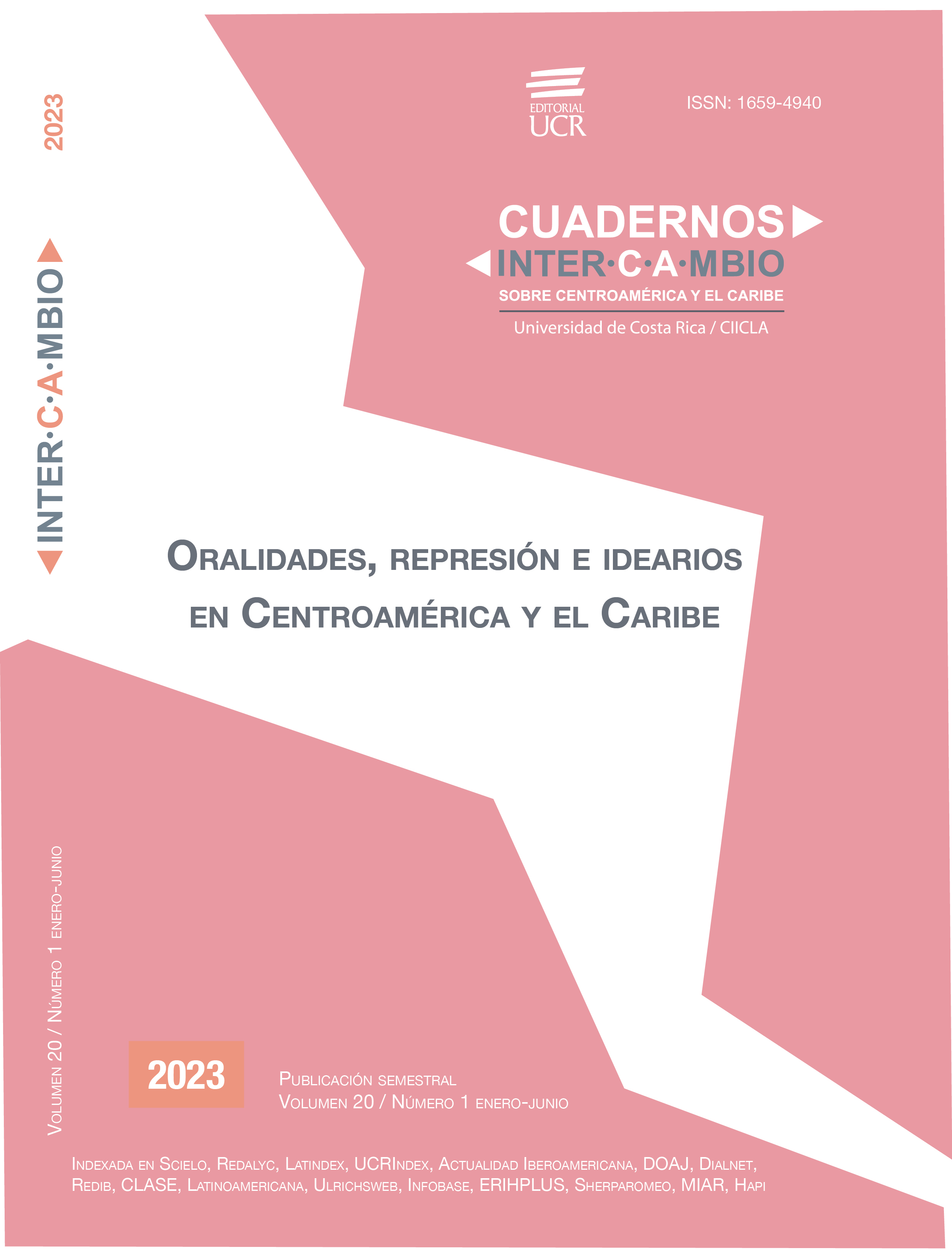Abstract
The article reflects on oral productions and their resistance in the Colombian Caribbean.It is motivated by the idea of decentering aesthetic and political relations that have been privileged in terms of literacy and that have made memory processes and verbal arts inherent to the speech forms of populations invisible on the margins of an aesthetic and literary canon, from the place of the Oralaloteca as an experience of a research and archive group. We start from the extended and disseminated ideas for the treatment of orality in dialogue with some of the oral pieces that have been collected over 17 years and that are systematized in the Oraloteca corpus. The results of the study aim to reflect on the multiplicity of the verbal arts of orality, taking into account the “letrado” prestige that has prevailed in the academy and seeking interdisciplinarity to contextualize and understand the dynamics of the Colombian Caribbean region in its oralities, recognizing its aesthetic and political values.
References
Anderson, Benedict. (1993). Comunidades Imaginadas. Reflexiones sobre el Origen y la Difusión del Nacionalismo. Fondo de Cultura Económico.
Ávalos, Edison. (2020). Los narradores de la tradición oral: el don impuesto por los seres del otro mundo. Revista Jangwa Pana, 19(2), 297-311. https://www.redalyc.org/articulo.oa?id=588069242005
Bhabha, Homi. (2002). El lugar de la Cultura. Manantial.
Cornejo-Polar, Antonio. (2003). Escribir en el Aire. Ensayo sobre la Heterogeneidad Socio-cultural en las Literaturas Andinas. Centro de Estudios Literarios Antonio Cornejo Polar, CELACP, Latinoamérica Editores.
Dumézil, Georges. (1977). Mitos y Epopeya. Editorial Seix Barral.
Escobar, Arturo. (2012). Más allá del Tercer del Mundo: Globalización y Diferencia. Instituto Colombiano de Antropología e Historia, ICANH. Editorial Universidad del Cauca.
Fals Borda, Orlando. (2002). Historia Doble de la Costa. Universidad Nacional de Colombia. Banco de la República. El Áncora.
García Márquez, Gabriel. (2014). Cien Años de Soledad. Penguin Random House Grupo Editorial, S.A.S.
Glissant, Édouard. (1997). Poetics of relation. The University of Michigan Press.
Goody, Jack. (1985). La domesticación del pensamiento salvaje. Editorial Akal.
Gramsci, Antonio. (1999). Cuadernos de la Cárcel. Edición crítica de del Instituto Gramsci. A cargo de Valentino Gerratana. Ediciones Era-Benemérita Universidad Autónoma de Puebla.
Harrison, David. (2016). Cuando Mueren las Lenguas. Universidad de los Andes.
Havelock, Eric A. (1996). La Musa Aprende a Escribir. Ediciones Paidós.
Instituto Distrital de Cultura de Bogotá. (2016). La Gruta Simbólica. https://www.idartes.gov.co/es/publicaciones/gruta-simbolica
Levi-Strauss, Claude. (1964). El Pensamiento Salvaje. Fondo de Cultura Económica.
Lienhard, Martin. (2003). La Voz y su Huella. Casa Juan Pablo y Universidad de Ciencias y Artes de Chiapas.
Lovel, Arnold. (1980). Sapo y Sepo, inseparables. Alfaguara.
Ong, Walter. (1987). Oralidad y Escritura. Fondo de Cultura Económica.
Rancière, Jacques. (2011). El tiempo de la igualdad. Diálogos sobre política y estética. Herder. https://doi.org/10.2307/j.ctvt9k53n
Rama, Ángel. (1982). Transculturación Narrativa en América Latina. Siglo Veintiuno Editores.
Rama, Ángel. (1991). La Narrativa de Gabriel García Márquez. Edificación de un Arte Nacional y Popular. Instituto Colombiano de Cultura. Colcultura.
Rama, Ángel. (1998). Ciudad Letrada. Arca.
Rocha Vivas, Miguel. (2003). Palabras mayores, palabras vivas. Tradiciones mítico-literarias y escritores indígenas en Colombia. Penguim Random House.
Rodríguez, Manuel Vicente. (s.f.). Recuerdos de un Bicentenario. Texto inédito.
Rojas, Patricia. (2019). Literatura Antillana: Francofonía y Negritud. Festival Internacional de Poesía de Medellín. https://www.festivaldepoesiademedellin.org/es/Diario/43.html
Silva, Fabio. (2014). La Oraloteca del Caribe colombiano. Investigando, salvaguardando y revitalizando la diversidad a través de la oralidad.. Espacios transnacionales: revista latinoamericana-europea de pensamiento y acción social, 2(3), 94-109.
Vich, Víctor y Zavala, Virginia. (2004). Oralidad y poder. Herramientas metodológicas. Editorial Norma.
Zapata, Manuel. (2010). Changó, el Gran Putas. Ministerio de Cultura.
##plugins.facebook.comentarios##

This work is licensed under a Creative Commons Attribution-NonCommercial-NoDerivatives 3.0 Unported License.
Copyright (c) 2022 The author


